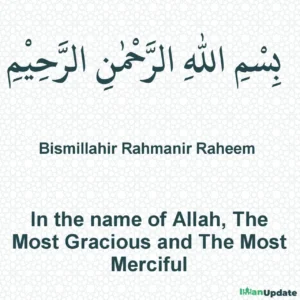Wa Alaikum Salaam wa Rahmatullahi Barakatuh Meaning & Arabic Text

“Wa alaikum salaam” is a standard response to the Islamic greeting “As-salamu alaykum“, which means “Peace be upon you”. This exchange of greetings is a deliberate way to acknowledge someone’s presence and make them feel welcome.
In this article, we will delve into the meaning, Arabic text, and pronunciation of the full response: “Wa alaikumsalam wa rahmatullahi wa barakatuh”.
Wa Alaikum Assalam wa Rahmatullahi Barakatuh in Arabic Text
In Arabic, walaikum Assalam wa Rahmatullahi Barakatuh is written as:
وَعَلَيْكُمُ ٱلسَّلَامُ وَرَحْمَةُ ٱللَّٰهِ وَبَرَكَاتُهُ
Wa Alaikum Salaam Rahmatullahi Wa Barakatuh Meaning In English
Wa alaikum assalam rahmatullahi wa barakatuh means and unto you be peace and the mercy and Blessings of Allah.
There are three versions of this greeting response, from the shorter one to the longer. These are:
- Wa ‘alaykum al-salaam (وَعَلَيْكُمُ ٱلسَّلَامُ)
- Meaning: And unto you peace
- Wa alaykumu s-salam wa rahmatullah (وَعَلَيْكُمُ ٱلسَّلَامُ وَرَحْمَةُ ٱللَّٰهِ)
- Meaning: May the peace and mercy of Allah be with you too.
- Wa alaykumu s-salam wa rahmatullahi wa barakatuh (وَعَلَيْكُمُ ٱلسَّلَامُ وَرَحْمَةُ ٱللَّٰهِ وَبَرَكَاتُهُ)
- Meaning: May the peace, mercy, and blessings of Allah be with you too”.
- Waalaikumussalam: “Peace be upon you.”
- Waalaikumsalam Warahmatullahi: “Peace be upon you and Allah’s mercy.”
- Waalaikumsalam Warahmatullahi Wabarakatuh: “Peace be upon you, Allah’s mercy, and blessings.”
- Wa Alaikum Salaam: وَعَلَيْكُمُ ٱلسَّلَامُ
- Waalaikumsalam Warahmatullahi: وَعَلَيْكُمُ السَّلَامُ وَرَحْمَةُ اللَّهِ
- Waalaikumsalam Warahmatullahi Wabarakatuh: وَعَلَيْكُمُ السَّلَامُ وَرَحْمَةُ اللَّهِ وَبَرَكَاتُهُ
When entering a house, it is essential to greet those present with the phrase “As-Salam Alaykum” (Peace be upon you). This greeting is not only a social courtesy but also a divine instruction.
Allah, the Almighty, has ordained that when we receive a greeting, we must respond with an equal or better greeting.
For instance, if someone greets you with “As-Salam Alaykum” (Peace be upon you), you should respond with “Wa Alaykum As-Salam” (Unto you be peace). Avoid reducing the greeting, as this is considered impolite.
If the person extends the greeting by adding “Wa rahmatullah” (And Allah’s mercy), you should respond with the same phrase, “Wa Alaykum As-Salam wa rahmatullah” (Unto you be peace and Allah’s mercy).
Similarly, if they add “Wa barakatu” (And Allah’s blessings), you should respond with the full phrase, “Wa Alaikum As-Salam wa rahmatullah wa barakatuhu” (Unto you be peace, Allah’s mercy, and blessings).
It is crucial to note that responding in like terms is mandatory, as Allah has commanded us to “return it equally” or “with what is better than it”.
This encompasses not only the words but also the manner and number of greetings. While responding with a better greeting is virtuous, it is not obligatory; what matters most is responding in kind.
For instance, if someone greets you with “As-Salam Alayka” (Peace be upon you), responding with “Ahlan wa marhaban” (Welcome! Welcome!) is insufficient, even if repeated multiple times.
This response lacks the required supplication and equal greeting, making it inadequate and sinful.
When someone says “As-Salam Alaika” (Peace be upon you), they are simultaneously supplicating for your safety and greeting you.
A response like “Ahlan wa marhaban” (Welcome! Welcome!) fails to meet this standard, as it only offers a greeting without supplication.
Therefore, it is essential to respond with a greeting that is better in type, number, or at least equal to the original greeting.

If someone greets you with “As-Salam Alaykum wa rahmatullah” (Peace be upon you and Allah’s mercy), responding with only “Alayka As-Salam” (Peace be upon you) is inadequate.
You must respond with a greeting that matches or surpasses the original, such as “Wa Alaykum As-Salam wa rahmatullah” (And upon you be peace and Allah’s mercy).
Additionally, the manner of response is important. If someone greets you loudly and clearly, respond similarly. If they turn to greet you, face them in return. Anything less would be considered deficient.
The noble verse emphasizes that even if a disbeliever greets you with “As-Salam alayka” (Peace be upon you), responding with “Wa alayka As-Salam” (And unto you be peace) is permissible, as you are merely reciprocating the greeting in kind.
Regarding the Prophet’s (SAW) statement, “When the People of the Book greet you, respond by saying ‘Wa alayka’ (meaning ‘and unto you’ or ‘same to you’),” it is important to note that we should not respond with “Wa alaikum As-Salam” (meaning ‘and unto you be peace’).
The Prophet (SAW) explained the reason for this in the same hadith, stating that the Jews would greet by saying “As-samu alaikum” (meaning ‘Death be upon you’), which is a prayer for death upon the recipient.
In response, the Messenger of Allah (SAW) instructed us to say “Wa alayka,” meaning “and unto you too,” essentially returning the greeting in kind.
However, when the People of the Book greet us with “As-Salam alaykum” (meaning ‘peace be upon you’), we should respond with “Wa alaikum Salam” (meaning ‘and unto you be peace’).
This is permissible and encouraged, as Allah (the most High) states, “When you are greeted with a greeting, greet in return with what is better than it or (at least) return it equally.”
This highlights the importance of responding to greetings in a manner that is equal to or better than the original greeting.
When greeting a group, use the plural form “As-Salam alaykum.” For an individual, use “As-Salam alaika” (peace be upon you).
If the greeter adds “wa rahmatullah” (and the mercy of Allah), this is commendable. Adding “wa barakatuhu” (and Blessings of Allah) is even better, as each phrase earns an additional reward of ten good deeds. However, simply saying “As-Salam alaykum” is sufficient.
The respondent should say “Wa alaykum As-Salam” (And upon you be peace). If the initiator adds phrases like “wa rahmatullah” or “wa barakatuhu”, the respondent should reciprocate accordingly, as stated in Surah An-Nisa: 86.
Imam Annawawi recommends using the conjunction “Wa” (and) in the response, making it “Wa alaykum…”. This clarifies the connection to the original greeting.
However, omitting it is not blameworthy, as Prophet Ibrahim did not use it in his response to the angels (Surah Adh-Dhariyat: 25).
When conveying a greeting from a third party, it is Sunnah to say “Alayhi As-Salam” (upon him be peace). Adding “Alaika wa alayhi As-Salam” (upon you and him be peace) or “Alayhi wa alayka As-Salam” (upon him and you be peace) is even better, as it supplicates for the second party who delivered the message.
If someone asks you to convey greetings on their behalf, it becomes obligatory if you promise to do so, as stated in Surah An-Nisa: 58. This is because you have taken on the responsibility to render back the trust.






